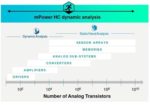A processor ISA provides an abstraction against which to verify an implementation. We look here at a paper extending this concept to accelerators, for verification of how these interact with processors and software. Paul Cunningham (GM, Verification at Cadence), Raúl Camposano (Silicon Catalyst, entrepreneur, former Synopsys… Read More
Electronic Design Automation
Electromigration and IR Drop Analysis has a New Entrant
My first IR drop analysis was back in the early 1980s at Intel, where I had to manually model the parasitics of the VDD and VSS interconnect for all of the IO cells that our team was designing in a graphics chip, then I ran that netlist in a SPICE simulator using transient analysis, measuring the bounce in VSS and droop in VDD levels as all… Read More
CEO Interview: Maxim Ershov of Diakopto
Maxim is a scientist, engineer, and entrepreneur. His expertise is in physics, mathematics, semiconductor devices, and EDA. Prior to co-founding Diakopto, Maxim worked at Apple’s SEG (Silicon Engineering Group), where he was responsible for parasitic extraction. Before Apple, he was CTO of Silicon Frontline Technology,… Read More
WEBINAR: SkillCAD now supports advanced nodes!
Originally containing a handful of commands to help with common layout tasks, SkillCAD has evolved into the industry standard for analog, RF and mixed signal design for customers using Cadence Virtuoso. With over 85 customers worldwide and over 120 functions including the powerful, patented V-editor, metal routing and pin… Read More
Formal Methods for Aircraft Standards Compliance
When promoting adoption of formal methods in functional verification, there are two hurdles to overcome: one technical, the other people. The first is a comfortable and familiar challenge for us engineers. Take the course, pass the test, get the certificate. Very mechanical and deterministic. People on the other hand are non-deterministic… Read More
Reliability Analysis for Mission-Critical IC design
Mission-critical IC design for segments like automotive, aerospace, defense, medical and 5G have more stringent reliability analysis requirements than consumer electronics, and entails running special simulations for the following concerns:
- Electromigration analysis
- IR drop analysis
- MOS aging
- High-sigma Monte Carlo
Continuous Integration of UVM Testbenches
In recent years, one of the hot topics in chip design and verification has been continuous integration (CI). Like many innovations in hardware development, it was borrowed from software engineering and the programming world. The concept is simple: all code changes from all developers are merged back into the main development… Read More
Verifications Horizons 2021, Now More Siemens
In a discussion with Tom Fitzpatrick of Siemens EDA he recalled that their Verification Horizons newsletter started 17 years ago, back when they were Mentor. We’ve known about the Siemens acquisition for a while. The deal closed in March 2017, but it wasn’t until January 1, 2021 that the legal entity merger was complete. Which makes… Read More
Ansys IDEAS Digital Forum 2021 Offers an Expanded Scope on the Future of Electronic Design
For those of you following the latest developments in electronic design it has become clear that the industry is transitioning through an inflection point that is shifting some of the ground rules of design. The increase in the speed and integration density in today’s systems are blurring the lines between chip design and system… Read More
Why Optimizing 3DIC Designs Calls for a New Approach
The adoption of 3DIC architectures, while not new, is enjoying a surge in popularity as product developers look to their inherent advantages in performance, cost, and the ability to combine heterogeneous technologies and nodes into a single package. As designers struggle to find ways to scale with complexity and density limitations… Read More











AI Bubble?